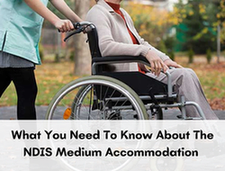
The NDIS program helps people with a disability live independently by providing funding for services and support. One of the services that the NDIS provides funding for is accommodation. Depending on the participant’s needs, this can be either short-term or long-term accommodation.
NDIS Short-term accommodation is for people who need a place to stay for a short time, such as when attending an NDIS-funded event or program. Long-term accommodation is for people who need a place to live on a more permanent basis.
The type of accommodation that a person can access through the NDIS depends on their circumstances and needs. This article will look at the different kinds of NDIS accommodation and what you need to know about each one.
About NDIS Medium Term Accommodation And What It Entails
The National Disability Insurance Scheme (NDIS) supports eligible people with a disability to help them achieve their goals and participate in the community. One of the supports available through the NDIS is Medium Term Accommodation (MTA).
MTA is a form of supported accommodation for people with a disability who are unable to live independently or who need support to maintain their tenancy. MTA can be provided in various settings, including group homes, boarding houses and supported apartments.
MTA is short to medium-term, typically lasting between six and 18 months. It is designed to provide support and stability while the person with a disability works towards their goals and transitions to more independent living.
If you are eligible for the NDIS and are interested in MTA, please contact your NDIS planner or NDIS home care Melbourne provider to discuss your options.
How Do You Get Qualify For NDIS Medium-Term Accommodation
NDIS Medium Term Accommodation (MTA) is a type of housing support that helps people with a disability to live independently in the community. MTA can be used for short-term stays or longer-term arrangements. It is designed to help people with a disability transition from living in supported accommodation to living independently in the community.
You must first meet the NDIS access requirements to be eligible for MTA. You must also have an ongoing need for supported accommodation and be able to live independently with the support of MTA. If you are suitable for MTA, you can access various support services to help you live independently.
What Are The Features Of Advance Care And MTA Support?
Advanced care and medium-term accommodation support allow people to access high-quality, personalised care and accommodation in a safe and comfortable environment. This type of support can be tailored to meet any NDIS participant’s needs and can be provided for a range of different periods.
Some of the features of advanced care and medium-term accommodation support include:
– Access to personalised care and support
– A safe, comfortable environment and NDIS Group Activities
– Tailored to meet any NDIS participant‘s needs
– Can be provided for a range of different periods